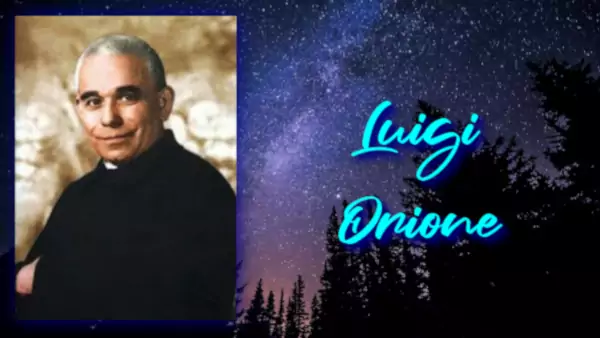16 May - Luigi Orione was born in Pontecurone, in the Diocese of Tortone, on 23 June 1872. His parents were simple peasants, who had a certain influence on the village through their honesty and Christian fervour. During his childhood, Louis worked in the fields and attended school irregularly.
Luigi Orione stands out from boys of his age because of his piety, although he is sometimes a brawler. At the age of 13, Luigi manages to convince his parents to let him join the Capuchin Friars Minor. Having entered the small novitiate in Voghera, the rhythm of life is rustic and comfort is non-existent. Luigi Orione falls ill with a serious form of tuberculosis. After almost dying, he was sent back to his family. On his return, he helps his father in road construction, which will leave him with an important experience of the working world.
In 1886, he joined the Oratory of Valdocco, directed by St. John Bosco. Luigi Orione had Don Bosco as his confessor and maintained a true friendship with him. We will always be friends," Don Bosco told him shortly before he died. Considered promising by his peers, Luigi Orione nevertheless felt that his vocation was not among the Salesians. In 1889 he entered the seminary of the diocese of Tortone. A peculiar seminarian, sometimes mocked by his comrades for his bubbling intelligence and devotion, Luigi Orione did not sleep in the seminary. In order to pay for his studies, he helps the sacristan of the cathedral and lodges in the bell tower. In his free time, he gathers street children to teach them catechism. The Bishop of Tortone, aware of the importance of his initiatives, lent him his garden for his catechism meetings.
On July 3, 1892, Luigi Orione inaugurated the first oratory to bring together street children. The following year, he obtained an abandoned house where he organized a school for about a hundred children. Luigi was a seminarian at the age of 21. A few other seminarians join him: it is the birth of the Little Work of Divine Providence. On April 13, 1895, Luigi Orione was ordained priest and celebrated his first Mass among his boys. On the same day, six of his boys received the cassock, with a view to becoming priests in their turn.
A new college opens in Noto, Sicily, at the request of the local bishop. Other houses are established in Rome and San Remo. Many clergymen join him in his enterprise. In 1899, Luigi Orione launched the branch of the Hermits of Divine Providence, to enable blind people to live a hermit's life. On 21 March 1903, Bishop Igino Bandi of Tortone recognised the Little Work of Divine Providence as a religious congregation of diocesan right. Their aim is to bring the simplest classes of society to the Church. Luigi Orione and his priests make a fourth religious vow (in addition to poverty, chastity and obedience): fidelity to the Pope.
In 1909, he made his religious profession in the hands of Pope Pius X in a private conversation. The relationship between this pope and Don Orione was very strong; they met many times and Pius X gave a great impulse to Don Orione's work. In 1908 and 1915, earthquakes in Silica and Calabria cruelly affected the population. Don Orione brought help and organised solidarity. Out of gratitude, Pius X appointed him Episcopal Vicar of the Diocese of Messina for three years. Don Orione was consulted by the popes and sent to resolve internal conflicts, especially in the context of the modernist crisis and the rise of Marxism in working class circles.
On June 29, 1915, Don Orione founded a feminine branch: the Little Missionary Sisters of Charity, animated by the same charism as the priests of the Little Work of Divine Providence. He added a contemplative branch to them: the Sister Sacramentine Adorators (who welcomed blind religious). For the laity who wanted to help him in his works at the service of the evangelization of the working classes and in his charitable works, he founded associations, which would later come together in the Don Orione Lay Movement. After the First World War, Don Orione multiplied the works in the service of the affected population: agricultural colonies, works of assistance for those who had lost everything, schools, orphanages. In the outskirts of the big cities he set up the "Little Cottolengo", a centre for help, education and catechism.
Don Orione's zeal led him to send missionaries to Brazil (1913), Argentina and Uruguay (1921), Palestine (1921), Poland (1923), Rhodes (1925), the United States (1934), England (1935) and Albania (1936). Don Orione made two trips to Latin America (in 1922 and from 1934 to 1937).
In addition to the many missions entrusted to him by the Popes to resolve difficulties within the Church or with personalities of the civil world, Don Orione preached hundreds of popular missions in churches and public squares in northern Italy. During these missions he spent several hours a day confessing. In order to enthuse the popular classes to return to religious practice, he organized processions, live nativity scenes, and pilgrimages. He also wrote several pamphlets to simply explain the Christian faith.
Don Orione had an important devotion to the Virgin Mary, which he first transmitted to his religious congregations. He had the Shrine of Our Lady of the Guard built in Tortone in 1931, mobilising the seminarians of the Little Work of Divine Providence who built it with their own hands. Don Orione also built the Shrine of Our Lady of Caravaggio in Corvino San Quirico.
At the beginning of 1940, suffering from heart problems, Don Orione was sent to rest in the house of San Remo. He declared: "it is not among the palm trees that I want to live and die, but among the poor who are Jesus Christ". However, he died 3 days later, on March 12, surrounded by his sons and sighing: "Jesus! Jesus! I am coming to you". The funeral procession, which passed through the large cities of northern Italy on its way to Tortone, mobilised huge crowds who came to cheer Don Orione as he passed by. He was buried in the sanctuary of the Guard of Tortone.
The cause for the beatification of Don Orione began in 1947. The survey on the holiness of his life, which gathered testimonies and writings, was sent to Rome in 1964, to be studied by the Holy Office. On 6 February 1978, Pope Paul VI recognised the heroic virtues of Don Orione and declared him venerable. A medical investigation into an inexplicable cure obtained through the intercession of Luigi Orione began in 1970. After the medical report concluded that there was no scientific explanation, Pope John Paul II recognized the miracle as authentic and signed the decree of beatification on April 13, 1980. Don Orione was solemnly proclaimed Blessed by Pope John Paul II on October 26, 1980, during a Mass celebrated in St. Peter's Basilica. On that occasion the Pope said of him: "He allowed himself to be guided solely and always by the logic of love! He had the temperament and the heart of the Apostle Paul".
A canonical recognition of the remains of Don Orione took place in 1965. To everyone's surprise, his body was discovered perfectly intact. There are no traces of decomposition, 25 years after his death. In 1980, on the occasion of his beatification, a new exhumation was carried out. A flood having seriously damaged the crypt where his tomb was located, his body was thought to be in an advanced state of decomposition. Finally, his body was found intact again. The incorruptible body of Don Orione is placed in a glass shrine, made in 1991. It is exposed for veneration by the faithful in the Sanctuary of Our Lady of the Guard in Tortone.
In 1999, a medical commission conducts a canonical investigation to analyse a new cure attributed to Don Orione's intercession. Once again declared inexplicable by science, John Paul II recognised the miracle as authentic and signed the decree of his canonisation on 7 July 2003. Don Orione was solemnly proclaimed a saint on 16 May 2004 by Pope John Paul II during a Mass celebrated in St Peter's Square.








